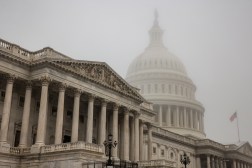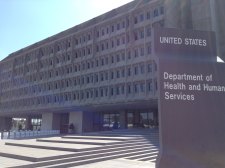Bush calls for NSA to replace DHS in civilian cyber role

The Department of Homeland Security should be stripped of its responsibility to defend civilian U.S. government computer networks in favor of the National Security Agency, GOP presidential candidate Jeb Bush said Thursday night — his second major cybersecurity policy pronouncement this week, and one of several from different candidates at the debates.
“We should put the NSA in charge of the civilian side of this [cybersecurity issue] as well — that expertise needs to spread across the whole of the government,” Bush said toward the end of the main debate between GOP candidates on Fox Business News.
The former Florida governor, who remains the first choice of many in the Republican Party establishment, was not the only candidate to raise the cybersecurity issue.
During the so-called undercard debate earlier that evening, former Hewlett-Packard CEO Carly Fiorina criticized the U.S. response to the North Korean cyberattack on the Sony film studio.
“The Sony attack could have been detected and repelled had legal authorities been passed in Congress allowing private networks and public networks to work together,” she said. “Those legal authorities have not yet been passed,” she added, thus making it clear she wasn’t referring to the liability protections for industry to government threat data sharing contained within the Cybersecurity Information Sharing Act the president signed into law at the end of last year.
During the main debate, retired neurosurgeon Ben Carson echoed the many national security officials who have described cyberattacks as one of the top threats America faces. But he then went on to outline a massive multimodal terror attack by ISIS, in which the Islamic extremists created an electromagnetic pulse through an airburst nuclear weapon, cyber attacked the power grid and set off multiple dirty bombs around the country.
“Can you imagine the chaos that would ensue at that point?” asked Carlton about his far-fetched scenario, which would require resources no credible experts believe ISIS to possess. He called on President Barack Obama to recognize ISIS “are in fact an existential threat to us.”
Like Carson, Bush raised the cyber issue in the context of a critique of the Obama administration’s record on national security.
“This is our first priority, the cybersecurity challenges that we face. This administration has failed us completely,” Bush said.
Earlier this week, Bush published an op-ed in Henry Blodget’s Business Insider, in which he called for heads to roll in the upper and middle management ranks of departments that get hacked.
“Agency chiefs who fail to prioritize cybersecurity and poorly performing IT managers must be held accountable,” he wrote — likely a sidelong cast at Donna Seymour, CIO at the U.S. Office of Personnel Management. Although OPM chief Katherine Archuleta resigned following the megahack of the agency by Chinese cyberspies, Seymour remains as CIO, despite vociferous calls from House GOP lawmakers for her to go.
In his remarks Thursday, Bush called it “shameful” that millions of files on actual and would-be federal employees should be in Chinese hands.






